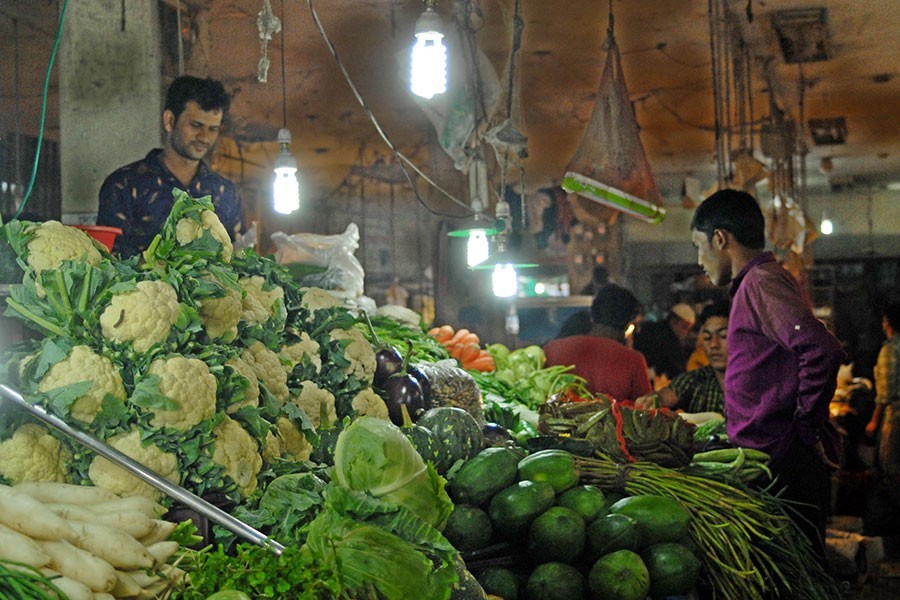
Published :
Updated :

Winter vegetables are selling at 60-180 per cent higher than the farm-level prices in the city's kitchen markets, although recent weeks saw rising supply from the key growing hubs, according to official data.
Middlemen are eating into a large portion of the profits, depriving consumers of cheaper vegetables, said officials and experts.
Traders, however, said they have to purchase vegetables at high prices from village markets.
Wholesalers and retailers in the city also blamed each other for such huge price gaps.
The latest data of the state-run Department of Agricultural Marketing (DAM) showed that current vegetables prices in Dhaka are 60-180 per cent higher than the farm-level prices in Bogura, Manikganj, Narsingdi, Mymensingh and Cumilla districts.
A small-sized cauliflower was selling at Tk 40-Tk 50, cabbage Tk 35-Tk 45 per piece, bottle gourd Tk 50-Tk 80 per piece, brinjal Tk 60-Tk 80 a kg, bitter gourd Tk 60-Tk 80 a kg, local bean Tk 60-Tk 80 a kg in Dhaka and Chittagong kitchen markets on Friday, the DAM report said.
But the prices of such vegetables are now Tk 18-Tk 20 (cauliflower) a piece and Tk 24-Tk 34 (bean) a kg in the veggie fields of the five districts, it showed.
According to the Department of Agriculture Extension (DAE), the production of winter vegetables is expected to hit a record 11 million tonnes in the current financial year (FY'19).
GM Mahiuddin, assistant director at DAM (market coordination), said the price gap between city market prices and farm-level prices ranges between 60 and 180 per cent, considering the prices of 14 types of winter vegetables and leafy vegetables.
Cauliflower is selling at Tk 18 a piece in Bogura, which is trading at Tk 40-Tk 50 in Dhaka at the retail level, he told the FE.
Brinjal (long) is selling at Tk 22-Tk 26 a kg in Narsingdi and Mymensingh districts, which is retailing at Tk 60-Tk 70 a kg in Dhaka, he added.
He also said there was no shortage of supply of vegetables in the wholesale markets like Karwan Bazar, Shaymbazar and Jatrabari now.
Traders at the district level and in metropolises are making most profits, depriving the consumers of cheaper vegetables, he remarked.
The commerce ministry should ensure strict market monitoring to minimise the price gap between the farmers' end and consumers' level, he said.
Md Abdul Hannan Mia, a South Jatrabari-based trader, told the FE that the present prices of vegetables are at least 30 per cent higher in Rangpur, Rajshahi, Dhaka, Chittagong, Mymensingh and Jessore regions than a year ago.
The production cost has increased significantly in the areas, he quoted farmers as saying.
Md Imran Ali Master, president of Bangladesh Vegetable Wholesalers Association, pointed out that there is a big price gap between Dhaka wholesale market and retail levels.
Karwan Bazar traders were selling bean at Tk 38-Tk 45 a kg, which is being traded at Tk 60-Tk 80 a kg at retail level, he said.
Juel Rana, a retailer at Shankar, West Dhanmondi, in the city, however, said prices at wholesale markets are much higher this year than a year back.
He said he bought quality local bean at Tk 55 a kg from Rayerbazar-Beribandh wholesale market on Friday, which was Tk 38-Tk 40 a kg in the same period of last year.
Consumers Association of Bangladesh (CAB) secretary Humayun Kabir Bhuiyan said the real income of people, especially the limited-income group, is declining, if rising prices of essential commodities are taken into account.
Such a huge price gap of vegetables exposed the structural problems in marketing of food items in the country, he said.
He called on the government to introduce farmers' markets in key points of big cities, which could benefit both farmers and consumers.
He also urged strict government monitoring to keep prices of essentials within the reach of commoners.
tonmoy.wardad@gmail.com


 For all latest news, follow The Financial Express Google News channel.
For all latest news, follow The Financial Express Google News channel.